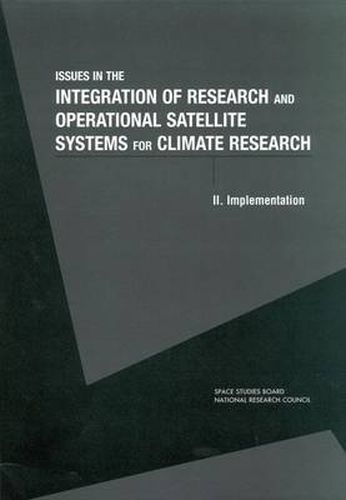Readings Newsletter
Become a Readings Member to make your shopping experience even easier.
Sign in or sign up for free!
You’re not far away from qualifying for FREE standard shipping within Australia
You’ve qualified for FREE standard shipping within Australia
The cart is loading…






This is the second of two Space Studies Board reports that address the complex issue of incorporating the needs of climate research into the National Polar-orbiting Operational Environmental Satellite System (NPOESS). NPOESS, which has been driven by the imperative of reliably providing short-term weather information, is itself a union of heretofore separate civilian and military programs. It is a marriage of convenience to eliminate needless duplication and reduce cost, one that appears to be working. The same considerations of expediency and economy motivate the present attempts to add to NPOESS the goals of climate research. The technical complexities of combining seemingly disparate requirements are accompanied by the programmatic complexities of forging further connections among three different agencies, with different mandates, cultures, and congressional appropriators. Yet the stakes are very high, and each agency gains significantly by finding ways to cooperate, as do the taxpayers. Beyond cost savings, benefits include the possibility that long-term climate observations will reveal new phenomena of interest to weather forecasters, as happened with the El Nino/Southern Oscillation. Conversely, climate researchers can often make good use of operational data. Necessity is the mother of invention, and the needs of all the parties involved in NPOESS should conspire to foster creative solutions to make this effort work. Although it has often been said that research and operational requirements are incommensurate, this report and the phase one report (Science and Design) accentuate the degree to which they are complementary and could be made compatible. The reports provide guidelines for achieving the desired integration to the mutual benefit of all parties. Although a significant level of commitment will be needed to surmount the very real technical and programmatic impediments, the public interest would be well served by a positive outcome.
$9.00 standard shipping within Australia
FREE standard shipping within Australia for orders over $100.00
Express & International shipping calculated at checkout
This is the second of two Space Studies Board reports that address the complex issue of incorporating the needs of climate research into the National Polar-orbiting Operational Environmental Satellite System (NPOESS). NPOESS, which has been driven by the imperative of reliably providing short-term weather information, is itself a union of heretofore separate civilian and military programs. It is a marriage of convenience to eliminate needless duplication and reduce cost, one that appears to be working. The same considerations of expediency and economy motivate the present attempts to add to NPOESS the goals of climate research. The technical complexities of combining seemingly disparate requirements are accompanied by the programmatic complexities of forging further connections among three different agencies, with different mandates, cultures, and congressional appropriators. Yet the stakes are very high, and each agency gains significantly by finding ways to cooperate, as do the taxpayers. Beyond cost savings, benefits include the possibility that long-term climate observations will reveal new phenomena of interest to weather forecasters, as happened with the El Nino/Southern Oscillation. Conversely, climate researchers can often make good use of operational data. Necessity is the mother of invention, and the needs of all the parties involved in NPOESS should conspire to foster creative solutions to make this effort work. Although it has often been said that research and operational requirements are incommensurate, this report and the phase one report (Science and Design) accentuate the degree to which they are complementary and could be made compatible. The reports provide guidelines for achieving the desired integration to the mutual benefit of all parties. Although a significant level of commitment will be needed to surmount the very real technical and programmatic impediments, the public interest would be well served by a positive outcome.